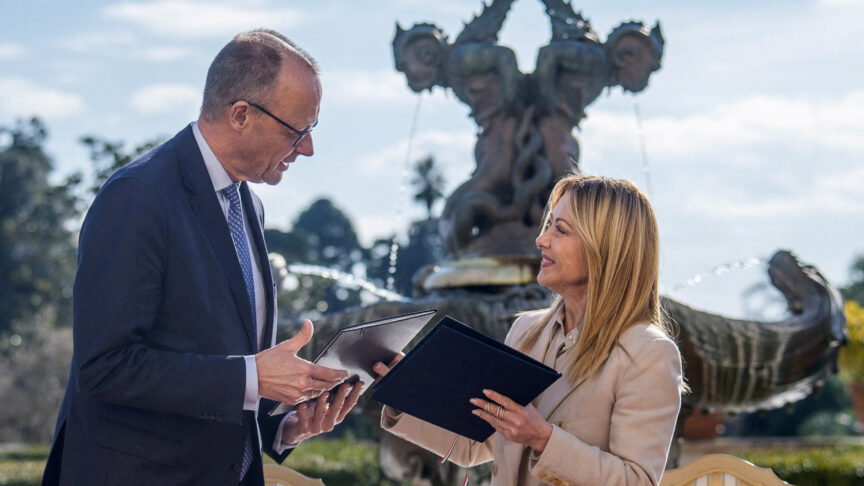The liberation of Europe
The remaining 27 EU members have turned the page after Brexit much faster than the UK itself.
British Prime Minister Theresa May recently made a splash by accusing European Union politicians and officials of seeking to disrupt the UK’s general election, scheduled for 8 June. After a damning account of a ‘disastrous’ dinner between Mrs May and Commission President Jean-Claude Juncker appeared in the German press, the prime minister claimed that the leak (which she attributed to Commission officials) had been “deliberately timed to affect the result of the general election.” In doing so, Mrs May paints a picture of European adversaries who want her to fail at home so as to weaken her negotiating hand in Brussels.
Mrs May is wrong. Most Europeans would like to see her enter Brexit talks with a strong negotiating hand, backed by a decisive majority in parliament. This is because they understand that the primary threat to a sensible Brexit deal will come not from hardcore ‘remainers’ unwilling to accept a severance, but from hardline eurosceptics unwilling to accept any maintenance of ties with Europe. A decisive victory in the upcoming general election would give Mrs May the popular mandate to silence extreme voices and allow her to make the necessary compromises for a deal to happen.
Secondly, the other 27 member states are frankly not that interested in the Brexit negotiations themselves. As much as some countries regret to see the UK go, they have turned the page faster than the UK itself. They have formulated their position and mandated the European Commission to do the negotiating on their behalf. For them, the preservation of the internal market is clearly more important than trade with the UK. Where they concern themselves with Brexit, it is primarily in terms of how the UK’s departure will alter the balance of power between the remaining members, and what political re-orientations will be required to adapt to the new landscape.
For example, there is the balance of power between the eurozone and the remaining eight non-eurozone members. The 19 members may take decisions in order to guarantee the stability of the common currency, affecting non-members – concerning banks, for example. It was primarily Britain’s forceful diplomacy that had secured for the non-members the ability to block or water down some eurozone decisions under certain circumstances. Brexit means the non-members are going to be fewer and politically weaker. As a result, there is now a renewed debate in the Czech republic as to whether joining the eurozone may now be necessary to avoid political marginalisation. Similar debates will likely be seen in other non-member states in the near future.
Then there is the balance of power in Europe, which will radically change after Brexit. First of all, Britain's smaller liberal allies in the north, such as The Netherlands and Denmark, realise they will have to foster new relationships across the EU in order to form majorities. They often relied on the strong weight of the UK if they wanted to push or block an issue in Brussels. No more. In the future, they will need many more countries on their side in order to assemble the required amount of votes. This kind of coalition building requires a different tactical approach. It calls for less assertiveness, or in any case less often. Smallish countries like The Netherlands, Belgium, Denmark and Austria will probably, as a result, slowly become more federalist.
Secondly, the north of Europe will lose approximately 12 percent of their voting weight after Brexit. The south will become more powerful. When the Spanish Prime Minister invited some colleagues from southern member states to Madrid for informal talks a few weeks ago, northern capitals suddenly paid attention.
One year ago, many seminars and conferences were titled ‘The Disintegration of Europe’ or ‘The End of Europe’. These titles have largely disappeared. What is debated now is ‘The Future of Europe’, focussing on the relaunch of the Franco-German axis or on flexible integration. The tone is already slightly more upbeat, also helped by the fact that decidedly pro-Europeans won recent elections in Austria and France, and to a certain extent The Netherlands. Brexit will fuel a brutal battle about money, no one has any illusion about that. But the idea of Brexit has largely been digested on the continent. After a long period of stagnation, it even enables them to move forward. This may well be what irks Mrs May the most.
Caroline de Gruyter, a Europe correspondent for NRC Handelsblad, is an ECFR Council member. She is based in Vienna.
The European Council on Foreign Relations does not take collective positions. ECFR publications only represent the views of their individual authors.


